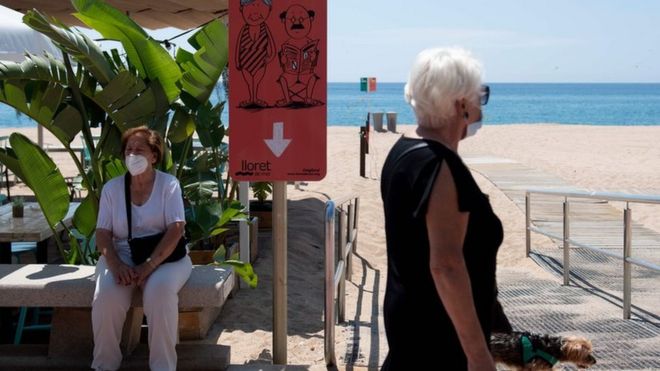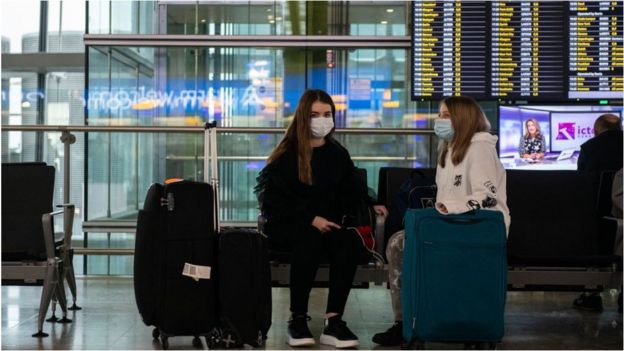Coronavirus: UK to open up European holidays from 6 July

Blanket restrictions on non-essential overseas travel will be relaxed in the UK from 6 July, ministers have said.
Holidaymakers are expected to be allowed to travel to certain European countries without having to spend 14 days in quarantine when they return.
They are thought to include Spain, France, Greece, Italy, the Netherlands, Finland, Belgium, Turkey, Germany and Norway - but not Portugal or Sweden.
The full list of travel corridors with the UK will be published next week.
A government spokesman said the new rules would give people "the opportunity for a summer holiday abroad" while also boosting the UK economy - but stressed the relaxation depended on risks staying low.
A traffic light system will be introduced - with countries classified as green, amber and red depending on the prevalence of coronavirus. The UK is likely to discuss arrangements with countries over the coming days.
The government said it "wouldn't hesitate to put on the brakes" if the situation changes.
Ministers in Scotland have said that a decision has not yet been taken to ease restrictions on holiday travel.
Although the UK government has powers over border controls, health protection issues on overseas travel must be supported by Scottish government regulations because health is a devolved matter.
 GETTY IMAGES
GETTY IMAGESTravel services have seen a sharp rise in the number of holiday bookings.
Andrew Flintham, managing director at TUI UK and Ireland, said the company had seen bookings increase by 50% this week compared to last, with Spain and Greece the most popular destinations.
John Keefe, director of public affairs at Eurotunnel, said phones have been "ringing off the hook" with eager customers wanting to make bookings. Maximum service of four departures an hour at peak times will resume from 6 July, he added.
Mr Keefe said bookings had been "growing" in the past three weeks, but they "exploded when the news came out last night".
Portugal has seen a rise in the number of new cases in and around Lisbon recently, while Sweden is also unlikely to be on the list because the infection rate there is higher than in the UK. They are both likely to be classified as red.
But the government spokesman conceded there would be nothing to stop someone avoiding quarantine by flying into a Spanish airport, driving over the border into Portugal for their holiday and returning by the same route.
UK travellers will still have to hand over the address they plan to stay at on their return from abroad, no matter which country they are coming back from. And they will also be legally required to wear face coverings on planes and ferries.
Portugal's Secretary of State for Tourism Rita Baptista Marques told BBC Breakfast her country had been named the most secure destination in Europe by the World Tourism and Travel Council and is a "clean and safe destination".
"Some countries are in this list and Portugal is fighting for a place," Ms Marques said, adding that the situation is "completely under control", with significant testing being carried out.
The travel sector has gone to war with the government over its blanket quarantine policy.
So a more nuanced, risk-based approach will quieten the critics to some extent.
But the storm of controversy swirling around this policy won't completely go away.
Portugal, which will probably not be on next week's list of exemptions, feels hard done-by.
The country is desperate that UK tourists return.
And although in public health terms the US is not currently close to being on the list, it does potentially present a tricky diplomatic dynamic, given the normally cosy relationship between Washington and London.
And the transatlantic flight market is lucrative too.
This announcement is a step in the right direction for UK aviation, but they want testing at airports to also provide another way for passengers to be exempt. So far, in public, the government has said very little about that.
 Greece's Tourism Minister Haris Theoharis suggested that it could be up to three weeks before the country is happy to open up an air bridge to the UK, as discussions with health experts are continuing.
Greece's Tourism Minister Haris Theoharis suggested that it could be up to three weeks before the country is happy to open up an air bridge to the UK, as discussions with health experts are continuing.Mr Theoharis told BBC Breakfast: "As soon as we have more clarity, we'll be able to convey the right dates and the right message so that's why it's not easy for me to pinpoint exact dates."
Spain lifted its state of emergency last Sunday, reopening its borders to visitors from most of Europe and allowing British tourists to enter the country without having to quarantine.
Travel industry group ABTA said the travel sector "eagerly" anticipates confirmation of the list of countries, which "should encourage customers to book".
"The blanket Foreign Office advice against all but essential travel is still a major impediment to travel, however, and we look forward to the government adopting a similar risk-based approach to that advice," it said in a statement.








Comments